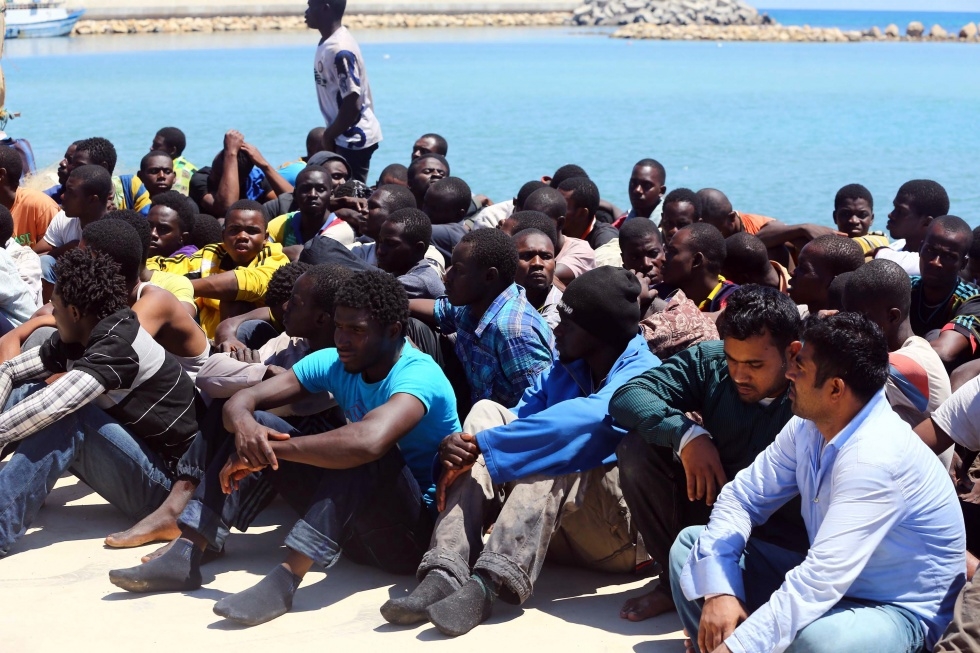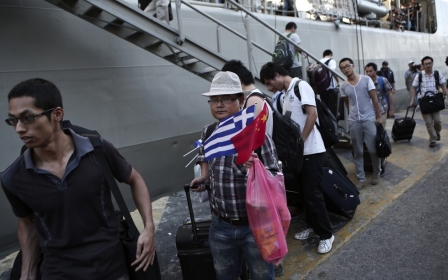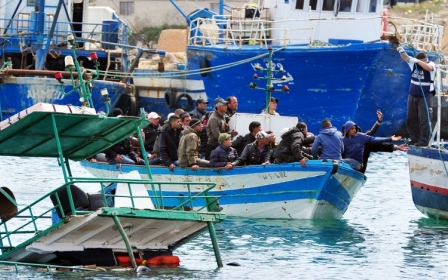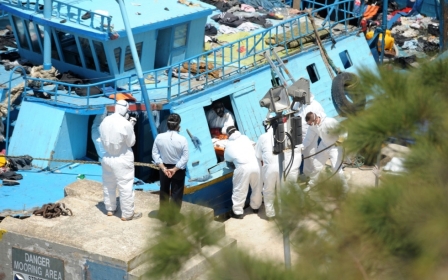Traffickers cash in on Libya's new civil war

While Libya burns in the flames of a new civil war, tens of thousands of would-be migrants continue to arrive at the country's coast, desperate to embark for Europe.
Libya’s lawlessness has made it a popular route for migrants heading to Europe from across Africa, the Middle East and far into Asia. Syrians and Palestinians flee war, Bangladeshis, Afghans, Somalis and Senagalese flee poverty. They all see Europe as their salvation, and Libya is their route.
The militias who control most of the country are often willing to let people-smugglers move migrants through the Sahara desert to the coast - for the right price.
According to Italian officials, in the first seven months of 2014 Italy has received 81,000 migrants from across the Mediterranean in small boats. This is more than the total for 2011 - when people were fleeing the uprising against Muammar Gaddafi.
Abu Ali fled fighting in his native Syria to Libya three years ago. Twice he had almost saved enough to embark with his family for Europe, doing odd jobs in Libya, only to be robbed by bandits. Then he started working as an agent, gathering up would-be migrants and putting them in touch with the smugglers who operate the boats.
Business was so good that he contemplated staying in Libya, but worsening militia violence has made him change his mind.
“I want to go to Europe,” he tells me when we meet on a beach near the western town of Zuwara, one of the key departure points for migrants sailing to Europe. “Here in Libya, I don’t feel safe anymore and I do this work just to collect some money and pay the journey to Europe for all my family.”
Militia violence has exploded in recent weeks into full-scale war. In the chaos, the would-be migrants are growing more desperate to escape.
While most of the diplomatic missions, including the US Embassy, have evacuated their staff this week with special flights from Tripoli, or by warship, or by land convoy to Tunisia, the migrants jump on the first boat they can find.
For the smugglers, this is big business. A trafficker from Zuwara, the main hub of human trafficking to Europe, says he has been in the business since 2006 and it has never been so easy. "Now the migrants no longer even ask what type of vessel I have for them, they just want to get away.”
His profits are huge. Each journey pours into the local smuggling network a minimum of $200,000, enough to abandon the boat on the high seas, and there are always more migrants begging for a place. Some smugglers don’t bother driving the boat, they just give the migrants the keys, happy to write off the cost of the vessel, leaving inexperienced migrants to manage the 200 miles of open sea.
“They just want to get away,” says the smuggler, in his thirties, who does not want to be identified. He insists his boats are safe, but that many of competitors send migrants to sea in any vessel, boat or raft they can find. “Most traffickers are not thinking of safety, that's why so many people die on the sea,” he says.
With the current fighting, the pace has gained momentum, with migrants packed into anything that might float, leaving in boats with leaks and worn out engines.
Libya’s small Coast Guard do their best, but have only a few inflatable boats and the use of some borrowed fishing vessels. On 30 July, coast guard personnel in the city of al-Khums, 120 kilometers East of Tripoli, rescued more than 20 migrants whose boat sank after getting only four miles offshore.
The Coast Guard captain told a local TV station that he had seen people clinging to the remains of a boat from the shore. These migrants were happy to be alive. In many other cases, bodies of migrants wash up ashore, nobody is sure who they are or what happened to them.
On 19 July, another boat sank 30 miles off the Libyan coast. Even though they were still in Libyan waters, the Italian Coast Guard coordinated the rescue, managing to save 62, but they were too late for another 70 souls who drowned.
Migrants in Libya need to go out to find a boat, and get casual work to pay for the voyage, but that means the risk of being scooped up by police or militia patrols and dumped in one of 19 migrant detention centres, most of which are overcrowded, filthy and see beatings from the guards.
“Detainees have described to us how male guards strip-searched women and girls and brutally attacked men and boys,” said Gerry Simpson, senior refugee researcher at Human Rights Watch, which reported on conditions in April. “The political situation in Libya may be tough, but the government has no excuse for torture and other deplorable violence by guards in these detention centers.”
The European Union and Italy have committed 12 mn euros ($16 mn) to support these centres, even as torture and abuse continue.
“The EU and Italy should suspend all assistance to the centers,” said Simpson. “Until the ministry agrees to investigate the abuses.”
While traffickers talk of expanding their business, Europe seems to have lost the plot.
Aside from Italy and Malta, who are on the front line of this problem, there is little sign of European Union leaders grappling with the big picture; either with a comprehensive plan for settling the migrants, or recognizing the root causes - war and poverty stalking vast areas of the world.
The head of the European Commission for the assistance of the border in Libya, EUBAM, Antti Juhani Hartikainen, said that his priority is not migration issues, but border security. But securing border posts makes little difference, because people-smugglers can take their clients across the vast desert.
In the meantime, Italy remains at the forefront of the massive flow. Rome has poured resources into naval patrols of operation Mare Nostrum, rescuing migrants in sinking boats at the rate of one boat-load a day.
However, the European Union refuses to financially support the Italian initiative, remarking its comprehensive approach to the Libyan borders security through EUBAM mission.
At the Crossing Borders conference organised by the Observatory on Migrants at the University of Bari last June, Fulvio Vassallo Paleologo, Professor of Rights of Asylum Seekers and the Constitutional State of Foreigners, said, "Italy’s Mare Nostrum has saved more than 30,000 lives in the last 6 months. The reception system in Italy is at a stalemate. Last year we counted only 12,000 places in our receiving facilities, but in the first seven months of this year almost 61,000 have arrived.”
Professor Vassallo advocates a review of the Dublin Convention, which mandates that refugees are given asylum in the first European Union country in which they arrive, saying the EU as a whole should share out the migrants arriving in Sicily.
New MEE newsletter: Jerusalem Dispatch
Sign up to get the latest insights and analysis on Israel-Palestine, alongside Turkey Unpacked and other MEE newsletters
Middle East Eye delivers independent and unrivalled coverage and analysis of the Middle East, North Africa and beyond. To learn more about republishing this content and the associated fees, please fill out this form. More about MEE can be found here.




